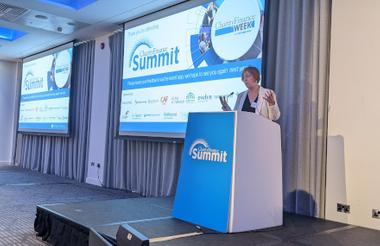Finance leaders are best placed to address social class disadvantage in their charities, the chief executive officer of the Social Mobility Foundation has said.
Sarah Atkinson was speaking at the Charity Finance Summit, Civil Society Media’s annual conference, last week.
In her closing keynote, Atkinson told delegates that although social class disadvantage is a feature of every sector in every major economy in the world, charities might be “more vulnerable” to the issue.
She said: “We know there’s a strong likelihood that charities struggle as much as every other sector when it comes to social class disadvantage, just as we do with every other aspect of inclusion and belonging. We also know the evidence that we do have support that.
“In fact, high status jobs – that’s us – which are relatively low paid – that’s us – are often the worst for social class disadvantage, just as they are for all other forms of inclusion because they favour people with elite qualifications and excellent professional experience who can also afford to work for low pay or unpaid. We’re looking a bit more vulnerable, perhaps.”
Charities ‘missing out on people with talent, potential and motivation’
Atkinson said that charities are “missing out on people with talent, potential and motivation because they don’t come from the right background”. “We might be losing the people we have because they don’t feel welcome or they don’t see that they can progress.”
She argued that people from working class backgrounds have different perspectives and experiences to offer, which are “vital” for organisations rooted in communities and fighting for fairness and human dignity through the services they deliver.
She said: “I recognise that making change, especially making radical change to make organisations more welcoming to people from different backgrounds, carries risk. All change carries risk and changing the way you do things can carry a particular risk. It’s rational to worry about whether people who have typical work experience or don’t have the qualifications, degrees or technical qualifications we’re looking for will be the best people to do the important things we ask them to do.
“Often at board level, we don’t recruit openly at all. We approach people from within our own networks because we need to get them into the room, we need to get the job done. But as key decision makers, not just on risk and finance, lots of you have responsibility for planning, performance, strategy and organisational resilience. Some of you are one person probably doing all of those jobs. You can take the lead on this in your organisations and in your teams because many of you are probably already the trailblazers on this.”
Lack of diversity in charity teams
Atkinson argued that individuals from lower socioeconomic backgrounds are more likely to operate in areas such as accountancy, HR, finance and IT than policy, communication or fundraising.
“You recognise the benefits and having people in your team who are resilient, cost conscious and who speak plainly to get things done and you have the potential to build the skills and capabilities required for the role. ‘Qualified by experience’ is a great phrase. You do see it in finance and HR adverts, you don’t often see it in a policy or fundraising role.”
Atkinson said that social class should not be considered in isolation from other aspects of inclusion.
“It’s not another thing you have to think about. Tackling social class disadvantage isn’t more important or less important than making a workplace welcoming for disabled people or supporting honest conversations about experiences of people of colour.
“If you don’t acknowledge social class inequality, your action on other forms of inclusion is weaker. Despite the attempts to pit anti racism against the class struggle, there is a significant overlap in the communities that is overlapping interests and recognising and celebrating identity and belonging and positive values and empowering individuals to be heard. That is the rising tide that will lift all the boats.”
‘No better time to make a bold change’
She concluded: “These are incredibly tough times and our organisations are coming under the twinning pressures of rising need and financial uncertainty. I know all of you are at the eye of the storm in feeling that pressure. Making inclusion a priority in those circumstances might well feel impossible but there’s no better time to make a bold change than when the status quo isn’t an option.
“[…] If we work together on this, I really believe our individual organisations and our sector will be stronger, better reflective of the communities we serve, more effective and more legitimate in carrying out our vital work.”
Related articles












